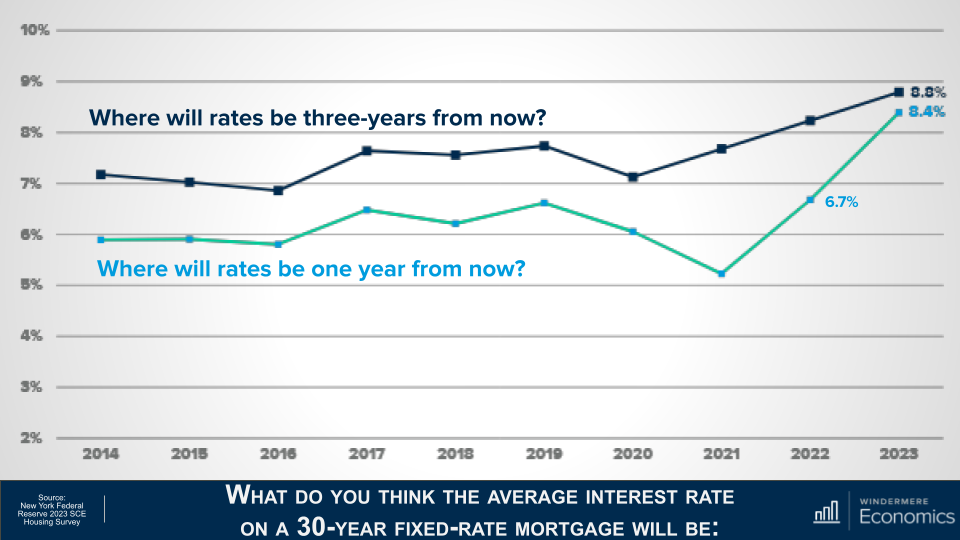Inman News
Take a look at the latest SCE Housing Survey which offers a detailed look at consumers’ psyche in regard to the housing market
OPINION BY MATTHEW GARDNER
I’ve always been fascinated by surveys as they frequently give me insights that I simply don’t get from just looking at raw data. As luck would have it, the New York Fed just released its 2023 Consumer Expectations Housing Survey. Now, this particular survey has always given me some great – and often surprising — insights as to how the U.S. population views the overall housing market.
We certainly don’t have time to cover all of the questions that the survey poses but there was one section I wanted to share with you today as it really resonated with me, and it relates to mortgage rates.
Questions (and answers) from the Fed survey
The first question asked was where they expected mortgage rates to be one year from now.

And as you see here, on average, households expected rates to rise all the way up to 8.4 percent.
Although some may see this as extreme you can see that in the 2022 survey respondents predicted rates would hit 6.7 percent — almost exactly where they were at the beginning of this March.
And when asked where they thought rates would be three years from now again, on average, households expected to see them climb to 8.8 percent. Now, that’s a rate we haven’t seen since early 1995.
Well, I’m not sure about you, but I was very surprised by these results as they counter just about every analyst’s expectation regarding where rates will be over the next few years. In fact, myself, and every economist I know, believe that rates will slowly pull back as we move through this year, and I haven’t seen a single forecast suggesting that mortgage rates will rise to a level this country hasn’t seen in decades.
But as they say, the devil’s in the details, and when I dug deeper into the numbers, it became very clear to me that demographics played a pretty big part in guiding people’s answers. Let me explain.

Here the data is broken down by educational achievement.
And you can see that survey respondents who didn’t have a college degree thought that mortgage rates would rise to 9.4 percent within a year.
But college graduates were far more optimistic, and they expected rates to be in the high 6’s.

And when asked to look three years out, respondents without degrees expected rates to break above 10 percent
While college graduates saw them pulling back a little from their one-year expectations of 6.7 percent, down to 6.4 percent

Now we are going to look at the survey results broken down by housing tenure.
And here you see that renters expect mortgage rates to be at almost 11 percent within a year.
And homeowners also saw them rising, but only up to 7.3 percent

And over the next three years, renters expected rates to break above 12 percent. That’s a level not seen since the fall of 1985.
But homeowners expected to see rates at a somewhat more modest 7.4 percent.
So, what does this tell us? I see two things.
Firstly, the rapid increase in mortgage rates that we all saw starting in early 2022 has a lot of people believing that we will see rates continuing to rise — sometimes at a very fast pace — over the next few years.
I mean, if it happened before, why can’t it happen again?
And this mindset leads me to my second point, which is that it’s very clear that a lot of would-be homebuyers just don’t understand how mortgage rates are calculated.
The bottom line here is that I see a potential buyer pool out there that needs educating and that can give an opportunity to brokers to discuss how rates are set – and where the market is expecting to see them head going forward.
And this may alleviate the concerns that many households have who may be thinking that they will never be able to afford to buy a home because of where they expect borrowing costs to be in the future.
Education is everything, don’t you agree?
Matthew Gardner is the Chief Economist for Windermere Real Estate, the second largest regional real estate company in the nation. Matthew specializes in residential market analysis, commercial/industrial market analysis, financial analysis, and land use and regional economics. He is the former Principal of Gardner Economics, and has over 30 years of professional experience both in the U.S. and U.K.
